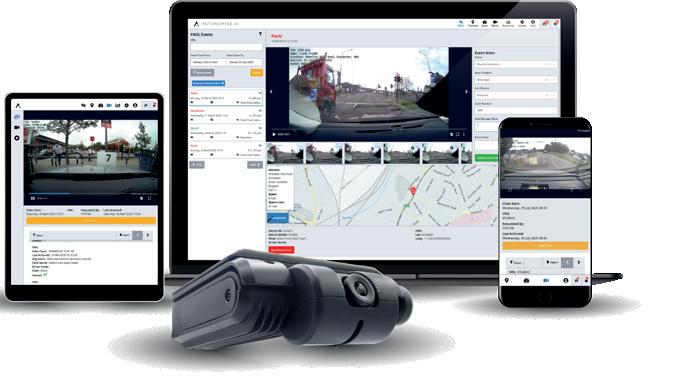4 minute read
Longcliffe celebrates Silver fleet Award
Demonstrating first-class commitment to the highest standards in safety, environment and operational efficiency across its road operation, Derbyshire based Longcliffe Quarries is celebrating the company achieving and maintaining its Fleet Operator Recognition Scheme (FORS) Silver accreditation.
FORS is a voluntary accreditation scheme for fleet operators. Originally brought in by Transport for London to improve safety for cyclists, it ‘aims to drive up standards within fleet operations and demonstrate which operators are achieving exemplary levels of best practice in safety, efficiency and environmental protection’*.
Longcliffe Logistics Manager James Hopkinson said: “We are delighted to win our FORS Silver accreditation for a third year. It is recognition for the whole logistics team from drivers through to maintenance mechanics and demonstrates our continued commitment to improving safety and environmental performance.”
To win and maintain FORS Silver, Longcliffe had to prove it is maintaining its progressive approach in six key areas including vehicle performance (emissions and air quality); road risk and cycle safety; professional development; and vehicle safety equipment.
Drivers are heavily involved in the work to achieve the FORS certification. For instance, to demonstrate the most positive approach to road risk and cycle safety, all 46 drivers had to take part in a full-day’s training which included spending half a day out on the road on bikes.
Driver and driver trainer Chris Dakin said: “This training was really successful, particularly for the driver’s that don’t cycle. It gave us all better perspective.”
To achieve FORS Silver, Longcliffe also had to demonstrate the highest standards of visibility equipment in its lorries. This includes a four-way camera system and an alarm which sounds when a vehicle is about to take a left turn.
Longcliffe Group Managing Director Paul Boustead adds: “This award is testament to the hard work of our fleet and logistics teams. It not only highlights our performance and safety commitments, but it also ensures we meet the standards expected by many of our customers.”
*https://www.fors-online.org.uk/cms/
Venson provides Electric Vehicle owners with practical advice on keeping vehicles moving this Winter
Newly registered plug-in vehicles now represent more than one in four new cars on the UK roads, which means there are a lot of first-time EV owners getting to grips with battery based motoring this winter.
During the colder months, Drivers must prepare themselves for more severe weather conditions. Venson Automotive Solutions is reminding new EV owners that some popular models are reported to reduce in battery range by as much as 52% at -5 degrees and urges them to plan ahead.
Alison Bell, Operations Director at Venson Automotive Solutions comments, “Although weather forecasts do usually predict severe weather conditions, many drivers still get caught out by the harsh driving conditions. And EV drivers face a different set of challenges to keep their vehicles road ready. In particular, the batteries that power EVs are very temperature sensitive, so bad weather can significantly reduce a car’s range and increase the length of time needed to recharge the battery. These are things owners must consider when preparing for a journey. Always aim to keep the vehicle’s battery between 20 percent and 80 percent charged and use the eco-mode whilst driving to reduce your rate of battery draining acceleration.”
There are other key measures that EV drivers can take to minimise battery drain when a big freeze sets in. This includes using the vehicle’s preheating function, also known as preconditioning, that heat the vehicle’s battery and cabin as required. Not only does this ensure the vehicle will be warm inside when the driver is ready to set-off, the program efficiently manages the heat once it hits a preferred temperature. This means that only the necessary amount of energy is used to warm the car and to regulate the temperature whilst on the road, again minimising battery drainage. Making sure the vehicle is plugged-in whilst preheating is vital though, so that the battery isn’t being drained by the process.
As with traditional fuel vehicles, tyre inflation is also important to a keep check on when EV winter driving. Due to the temperature dropping during winter, tyres will begin to contract as the air pressure falls, negatively impacting battery drain. Regularly inflating tyres will avoid this and help to maximise road grip at all times.
Alison Bell continues; “Whatever powertrain vehicle you are driving this winter, it is important to prepare your vehicle, so it functions efficiently in adverse driving conditions. Not only does it reduce wear and tear, but it also helps mitigate against the chances of having an accident due to driving a poorly maintained vehicle.”
Use the vehicle’s precondition function. This allows the driver to heat or cool the battery and cabin as needed, allowing the stored energy in the battery to be used as its main purpose, to power the vehicle. By making sure the car is plugged in while preconditioning means you are not draining the battery.
Be Battery Kind. Batteries like consistency, so, when possible, avoid running your battery super low. Aim to stay between 20 and 80 percent charged whenever you can to maximise battery efficiency and longevity.
Regenerative Braking. When the battery is very cold using the regenerative braking system will be less effective. Therefore, turn it off when driving in icy and/or snowy conditions and rely on the vehicle’s friction brakes until the battery warms up.
Use the Eco Mode. Eco Mode generally reduces the amount of power supplied to the drive motor and features, like the cabin heater. Used in the winter, it can reduce the power to the motor, so the car accelerates more slowly – not a bad thing as it reduces the possibility of wheel spin. Avoid freezing ‘fuel cap’. In extreme cold weather leave the vehicle plugged in overnight to avoid a frozen fuel cap should you need to charge the vehicle in the morning. Also be prepared, refer to the manufacturer’s guidance for how to release the fuel cap manually.
Properly inflated tyres. As the temperature drops, tyre pressure falls and under-inflated tyres create more road friction, which impacts on the vehicle’s efficiency. Drivers need to check tyre pressure and general tyre health regularly as properly inflated and safe tyres are an easy way to help maximise winter range.
For more information visit: www.venson.com










